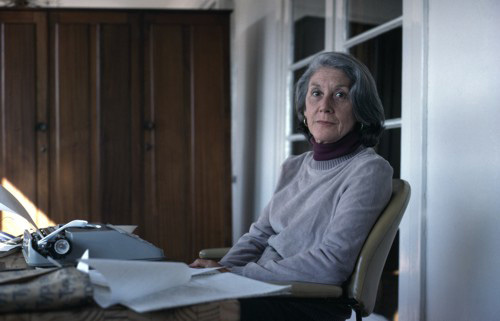UCT mourns death of literary grande dame Nadine Gordimer
16 July 2014 | Story by Newsroom
UCT notes with sadness the passing of South African literary giant Nadine Gordimer (90) at her home in Johannesburg on 13 July. Gordimer is counted among the university's extended community, having been awarded a Doctor of Literature in 1986, just five years before winning the Nobel Prize for Literature in 1991.
Known for her strong anti-apartheid views, Gordimer wrote 15 novels and several volumes of short stories. Her work was published in 40 languages.
Head of UCT's Department of English Language and Literature, Associate Professor Meg Samuelson, said: "Nadine Gordimer was one of the great writers and humanitarians of our time. Her literary and social vision was simultaneously acute and expansive, and she held her finger firmly on the pulse of South African society for over six decades, mapping and recalibrating our world.
"Always courageous in the face of injustice and oppression, she was also a writer who took risks with literary form as she crafted novel modes through which to probe and present what one of her most insightful readers, Stephen Clingman, describes as 'history from the inside'."
Samuelson continued: "She will perhaps be best remembered for novels such as The Conservationist (1974) and July's People (1981) that both responded to and defined the times in which they were produced '“ the former producing an idiom of surfacing and spectrality that continues to inform South African writing and literary debates, and the latter giving shape to understandings of the South African 'interregnum' '“ but she was often at her sharpest in her first genre '“ the short story '“ as well as in her essays on apartheid, censorship, and what she described as the 'essential gesture' of writerly responsibility."
Fellow author, former UCT vice-chancellor, and chair of the Nelson Mandela Foundation, Professor Njabulo Ndebele noted: "We have lost a great writer, a patriot and strong voice for equality and democracy in the world."
Gordimer's work won many other prizes, including the Booker Prize for Fiction (now the Man Booker Prize) for The Conservationist, the James Tait Black Memorial Prize for A Guest of Honour in 1971, and the CNA Literary Award four times.
She was involved in grassroots political-literary development and founding member and patron of the Congress of South African Writers.
Gordimer on life, death and meaning
In an interview with The Paris Review from the late 1970s, early 1980s, Gordimer once reflected on life, death, and the purpose of it all: 'Death is really the mystery of life, isn't it? If you ask, 'What happens when we die? Why do we die? you are asking, 'Why do we live?' Unless one has a religion . . . Without a religious explanation, one has only the Mount Everest argument: 'I climb it because it's there. I live because there is the gift of life.' It's not an answer, really, it's an evasion. Or, 'I think my purpose on this earth is to make life better.' Progress is the business of making life more safe and more enjoyable . . . fuller, generally. But that justification, it stops short of death, doesn't it? The only transcendent principle is that you are then seeking to improve the human lot for future generations. But we still don't get past the fact that it's a turnabout business; it's your turn and then it's mine, and life is taken up by somebody else."
 This work is licensed under a Creative Commons Attribution-NoDerivatives 4.0 International License.
This work is licensed under a Creative Commons Attribution-NoDerivatives 4.0 International License.
Please view the republishing articles page for more information.










